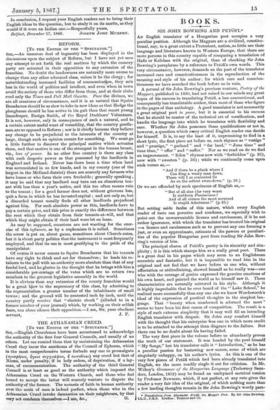REFORM.
[To THE EDITOR OF THE "SPECTATOR."] SIR,—Au immense deal of ingenuity has been displayed in the discussions upon the subject of Reform, but I have not yet seen any attempt to set forth the real motives by which the country party are actuated in their opposition to any extension of the franchise. No doubt the landowners are naturally more averse to change than any other educated class, unless it be the clergy ; for notwithstanding increased facilities of communica4on, they mix less in the world of politics and intellect, and even when in town avoid the society of those who differ from them, and at their clubs read only the Times and Pall Mall Gazette. Pace the divines, we are all creatures of circumstance, and it is as natural that Squire Broadacres should be as slow to take in new ideas as that Hodge the ploughman should be less active in his gait than that smart young linendraper, Ensign Smith, of the Royal Dashboro' Volunteers. It is not, however, only in consequence of such a natural, and to a certain extent useful want of versatility, that the country gentle- men are so opposed to Reform ; nor is it chiefly because they believe any change to be prejudicial to the interests of the country at large, though such an opinion counts for something. We must go a little farther to discover the principal motive which actuates them, and that motive is one of the strongest in the human breast, viz., love of power. In no other free country is there any class with such despotic power as that possessed by the landlords in England and Ireland. Never has there been a time when land was accumulated in so few hands, and in my county (one of the largest in the Midland district) there are scarcely any farmers who have leases or who farm their own freeholds ; generally speaking, it may be said that any landlord may turn out an obnoxious ten- ant with less than a year's notice, and this too often means ruin to the tenant ; for a good farmer does not, without grievous loss, quit a farm in which he has invested capital ; and not only so, but a discarded tenant usually finds all other landlords prejudiced against him. For such absolute power as this, landlords have to pay a certain price, and this price is exactly the difference between the rent which they obtain from their tenants-at-will, and that which they might obtain if their land were let on lease.
As may be supposed, occasions are not wanting for the exer-
cise of this influence, as by a euphemism it is called. Sometimes the screw is put on about game, sometimes about Church-rates, but it is about party politics that the instrument is most frequently employed, and that its use is most gratifying to the pride of the manipulator.
Of course it never occurs to Squire Broadacres that his tenants have any right to think and act for themselves ; he leads his re- tainers to the poll withnn authority more absolute than that of any feudal lord, and he glories in the thought that he brings with him a considerable per-centage of the votes which are to return two members to the greatest legislative assembly in the world.
It is obvious than any extension of the county franchise would be a great blow to the supremacy of this class, by admitting to the representation a greater number of the inhabitants of small towns ; and the ground will be contested inch by inch, until the country partly receive that "electric shock" (alluded to in a former number of your journal) which, by working on their selfish fears, can alone silence their opposition.—I am, Sir, your obedient




































 Previous page
Previous page